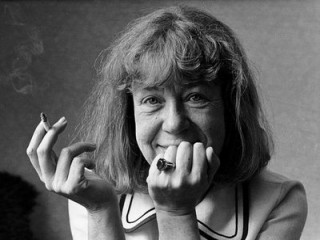
Tove Ditlevsen biography
Date of birth : 1917-12-14
Date of death : 1976-03-07
Birthplace : Copenhagen, Denmark
Nationality : Danish
Category : Famous Figures
Last modified : 2011-10-11
Credited as : poet, novelist,
3 votes so far
Tove Ditlevsen was born in Copenhagen. She grew up in a working-class neighborhood of Vesterbro, as the child of constantly arguing and often impoverished parents. Her father, Ditlev N. Ditlevsen, who was 37 when she was born, worked as a fireman. The domineering figure of Ditlevsen's childhood was her mother, Alfrida (née Mundus), ten years junior to her husband. Ditlevsen's background reflected in her formally traditional poems, where the major theme was loneliness in the big city. She also dealt with erotic problems, joy of love, marriage, and motherhood. Another central theme is the effects of childhood experiences on adulthood; her friends at that time were mostly interested in sex and stealing. In the poem 'Rain' she wrote: "Drunk men / are not dangerous / said my / girlfriend / child molesters / are always sober." (transl. by Cynthia Norris Graae, Canadian Woman Studies, Vol 8, No 2, 1987)
Her first poems Ditlevsen wrote at the age of ten. After finishing school Ditlevsen worked at an office from 1932. Her three marriages (with Viggo F. Møller, Ebbe Munck, and Carl Theodor Ryberg) in the 1940s did not bring her the happiness she expected. Ditlevsen was twenty-two when she married Møller, he was thirty years her senior, editor of the literary magazine Vild Hvede, in which she had debuted with the poem 'Til mit døde barn' in 1937. Ditlevsen, who felt that her husband did not pay enough attention to her, had an affair with the poet Piet Hein. With Victor Andreasen, whom she married in 1951, Ditlevsen had her most enduring relationship although they separated in 1973. In 1941 Ditlevsen published her first book, PIGESIND, a collection poems. Ditlevsen first attracted attention in 1941, when she wrote a novel about child molestation, MAN GJORDE ET BARN FORTRÆD. In the novel BARNDOMMENS GADE (1943) Ditlevsen used her own childhood memories.
Ditlevsen's own experiences were the focal point of her writing. "Girls can't be poets," had her father once said. Among her autobiographical works are BARNDOM, UNGDOM, GIFT (1967-76), and OM MIG SELV (1975). All of her novels drew material from her difficult childhood, three failed marriages, and her experiences as a female writer. The title of Gift refers to her drug addiction. From her husband, who was a doctor, Ditlevsen received Pethidine injections. She used this addictive, narcotic drug, for years. ANSIGTERNE (1968, The Faces) was a psychological masterpiece, exploring the psychosis of a woman, who is torn between her roles as mother, wife, and writer. "We’ve found out what kind of person you are. When you’re going to write a book, you go around looking at all kinds of other books written by people who know their stuff. You steal a sentence from every book and put them together like a puzzle, and then you make people think that you’ve written every sentence yourself." (from The Faces, transl. by Tiina Nunnally) The autobiographical WILHELMS VÆRELSE (1976) was about a destructive marriage.
Ditlevsen's ruthlessly honest memoirs, DET TIDLIGE FORÅR (1976, Early Spring), depicted her first eight years in a harsh working-class neighborhood in Copenhagen during the depression. The narrator learn about politics and unemployment, drunkenness and prostitution of the adult world around her. "When we reach Gasværksvej, where we usually turn around, Ruth says, 'Let's go down and look at the whores. There are probably some who have started.' A whore is a woman who does it for money, which seems to me much more understandable than to do it for free. Ruth told me about it, and since I think the word is ugly, I've found another in a book: 'Lady-of-the-evening'." (from Early Spring, 1976) The work starts with the words "in the morning there was hope"and culminates in the publication of her first book – but at the background of this opening was a writer's block, which shadowed Ditlevsen's last creative years.
Selected works:
PIGESIND, 1939
MAN GJORDE ET BARN FORTRÆD, 1941 - Lapselle on tehty pahaa (suom. Yrjö Korhonen, 1950)
LILLE VERDEN, 1942
BARNDOMMENS GADE, 1943
DEN FULDE FRIHET, 1944 - Complete Freedom, and Other Stories (translated from Danish by Jack Brondum, 1982)
FOR BARNETS SKYLD, 1946
BLINKENDE LYGTER, 1947
DOMMEREN, 1948
KÆRLIGHEDSDIGTE, 1949
UTVALGDE DIGTE, 1954
KVINDESIND, 1955
FORAAR, 1956
ANNELISE - TRETEN ÅR, 1959
FLUGTEN FRA OPVASKEN, 1959
HVAD NU ANNELISE?, 1960
TO SOM ELSKER HINANDEN, 1960
DEN HEMMELIGE RUDE, 1961
DEN ONDE LYKKE, 1963
DER VAR ENGANG EN LILLE HEST, 1963
DIGTE I UDVALG, 1964
DIGTE OM BØRN, 1965
ERINDRINGER II, 1967
ANSIGTERNE, 1968 - The Faces (transl. by Tiina Nunnally, 1991)
BARNDOM, UNDOM, GIFT, 1967-1976 (trilogi)
DE VOLKSNE, 1969
GIFT, 1971
PARENTESER, 1973
DET RUNDE VÆRELSE, 1973
TOVE DITLEVSEN OM SIG SELV, 1975
MIN NEKROLOG OG ANDRE SKUMLE TANKER, 1975
WILHELMS VÆRELSE, 1976
DET TIDLIGE FORÅR, 1976 - Early Spring (transl. by Tiina Nunnally, 1976) - film: Barndommens gade, 1986, prod. Danmarks Radio (DR), dir.by Astrid Henning-Jensen, starring Sofie Gråbøl, Carl Quist Møller, Vigga Bro, Torben Jensen, Louise Fribo
EN SIBYLLES BEKENDELSER, 1976
TILL EN LILLE PIGE: EFTERLADTE DIGTE, 1977
Complete Freedom, and Other Stories, 1982
KÆRE VICTOR. BREVE FRA TOVE DITLEVSEN TIL VICTOR ANDREASEN 1972-76, 1993
















